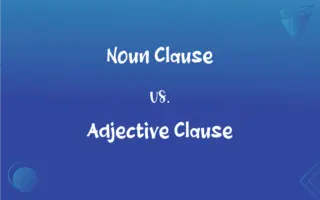Intellectual vs. Intelligent: What's the Difference?
Edited by Aimie Carlson || By Janet White || Published on January 16, 2024
Intellectual refers to involving or possessing a high level of understanding or mental activity, often in academic or theoretical realms, while intelligent denotes having or showing quickness of mind, understanding, and learning.

Key Differences
Intellectual relates to the realm of ideas, thought, and academia, focusing on deep understanding and mental pursuits, whereas intelligent describes the capacity for learning, reasoning, and understanding quickly and easily.
Intellectual often pertains to scholarly activities or individuals engaged in critical thinking and theoretical discussions, while intelligent broadly applies to practical problem-solving and adaptability in various situations.
Being intellectual is sometimes associated with academic or philosophical contexts, implying a focus on theory over practice, whereas being intelligent is often viewed as an innate ability, useful in both practical and theoretical scenarios.
Intellectual abilities are typically developed through education and prolonged engagement with complex ideas, while intelligence is often considered a natural capacity that can be enhanced through learning and experience.
Intellectual pursuits are commonly linked with the arts, sciences, and philosophy, emphasizing critical analysis and theoretical understanding, while intelligence is valued in diverse fields, from technology to everyday problem-solving.
ADVERTISEMENT
Comparison Chart
Definition
Relating to deep understanding, often academic
Showing quickness of mind and understanding
Primary Focus
Theoretical knowledge, critical thinking
Learning, reasoning, practical problem-solving
Associated Activities
Scholarly work, philosophical discussions
Adapting, solving real-world problems
Development
Through education and engagement with ideas
Innate ability, enhanced by learning
Social Perception
Associated with academia and theory
Viewed as practical and versatile
ADVERTISEMENT
Intellectual and Intelligent Definitions
Intellectual
Intellectual pertains to the life of the mind and deep understanding.
The conference gathered intellectual minds from various fields.
Intelligent
Intelligent implies being mentally sharp and perceptive.
His intelligent observations often led to innovative solutions.
Intellectual
Intellectual involves engaging in critical and analytical thinking.
Her intellectual approach to literature revealed deeper meanings.
Intelligent
Intelligent describes someone who can think and understand quickly.
She was known as an intelligent and quick-witted debater.
Intellectual
Intellectual often relates to scholarly or academic activities.
She was known for her intellectual contributions to science.
Intelligent
Intelligent refers to the ability to learn and adapt effectively.
Her intelligent approach to problem-solving was impressive.
Intellectual
Intellectual is characterized by a focus on theoretical concepts.
His intellectual pursuits led him to study philosophy.
Intelligent
Intelligent means having or showing quickness of understanding.
The intelligent student grasped complex concepts easily.
Intellectual
Intellectual denotes a person deeply engaged in mental activities.
The professor was an intellectual figure in the community.
Intelligent
Intelligent encompasses cognitive abilities like reasoning.
The AI system was remarkably intelligent in processing data.
Intellectual
Of or relating to the intellect.
Intelligent
Having intelligence
Is there intelligent life elsewhere in the galaxy?.
FAQs
Can intellectual abilities be developed?
Yes, through education and engagement with complex ideas.
What does intellectual focus on?
It focuses on deep thinking and understanding, often in an academic sense.
Do intellectual pursuits involve practical application?
They can, but often focus more on theory and analysis.
Are intellectual people always interested in books and studies?
Often, but intellectualism can manifest in various ways.
How is intelligence used in everyday life?
In practical problem-solving and adapting to new situations.
Is intelligence innate or acquired?
It's often considered an innate ability but can be enhanced through experience.
Is intelligence measurable?
It can be assessed through various cognitive tests, though it's multifaceted.
How is intelligence typically exhibited?
Through quick learning, understanding, and problem-solving.
Is intelligence related to quick thinking?
Yes, it often involves being quick-witted and perceptive.
Can one be intellectual in non-academic fields?
Absolutely, it's about deep engagement with ideas, regardless of the field.
Are intellectual activities limited to academia?
Primarily, though they can extend to any deep, critical thinking.
How is intelligence applied in technology?
Through the development of smart, adaptive systems and AI.
Can intellectual interests change over time?
Yes, they can evolve with new experiences and learning.
Can an intelligent person be not intellectual?
Yes, intelligence doesn't necessarily imply academic or theoretical engagement.
Is emotional intelligence part of being intelligent?
Yes, emotional intelligence is a significant aspect of overall intelligence.
Does being intellectual mean being knowledgeable?
It involves knowledge, but more importantly, deep understanding and thought.
Does intelligence guarantee success?
It contributes, but success also depends on other factors like hard work.
Is intelligence a factor in leadership?
Effective leadership often requires a degree of intelligence.
Do intellectual pursuits require formal education?
Not necessarily, self-directed learning can also lead to intellectual growth.
How do intellectual pursuits benefit society?
They foster critical thinking, innovation, and cultural enrichment.
About Author
Written by
Janet WhiteJanet White has been an esteemed writer and blogger for Difference Wiki. Holding a Master's degree in Science and Medical Journalism from the prestigious Boston University, she has consistently demonstrated her expertise and passion for her field. When she's not immersed in her work, Janet relishes her time exercising, delving into a good book, and cherishing moments with friends and family.
Edited by
Aimie CarlsonAimie Carlson, holding a master's degree in English literature, is a fervent English language enthusiast. She lends her writing talents to Difference Wiki, a prominent website that specializes in comparisons, offering readers insightful analyses that both captivate and inform.































































